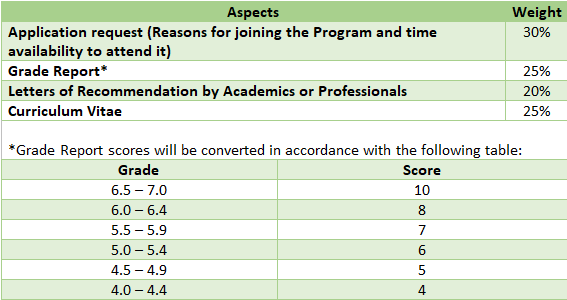Overview
The Master's of Science with mentions in Industrial Statistics and Applied Mathematics is an academic program born from the need to train graduates with advanced knowledge in the Industrial Statistics and Applied Mathematics fields. Graduates of the program must display some degree of independence in reflective and analytical thinking, as well as training in deepening their knowledge regarding recent advances, with the goal to apply it within their field.
Duration: The program has a duration of 4 semesters.
The mention in Industrial Statistics’ goal is:
To provide graduates with high-level professional specialization for their efficient performance in formulating and implementing statistical models for the development of new techniques and methods for solving problems inherent to the industrial field.
The mention in Applied Mathematics’ goal is:
To provide graduates with high-level professional specialization for their efficient performance in formulating and implementing mathematical models that contribute to the development of new techniques and methods inherent to industry.
Graduates of the Master’s of Science with a mention in Industrial Statistics program are trained to:
- Create or adapt statistical models that contribute to solving problems within the industrial field.
- Participate in interdisciplinary groups, sharing knowledge in statistical models and their industrial applications.
- Participate in university-level academia.
- Graduation profile for the mention in Applied Mathematics
Graduates of the Master’s of Science with a mention in Applied Mathematics program are trained to:
- Create or adapt mathematical models that contribute to the solving of problems related to the industrial field.
- Participate in interdisciplinary groups, sharing knowledge in mathematical models and their industrial applications.
- Participate in university-level academia.
Industrial Statistics
This research area presents important topics, such as the consolidated “Theory of Distributions and Applications”. It is based in creating and developing new statistical models, as well as extending and modifying existing models to analyze and apply in different fields of knowledge.
Applied Mathematics
This research area is based on the following topics: Lie Algebra, which is based in studying Lie Algebras, their representations, and some applications in different areas of mathematics and physics. Partial Differential Equations, where the mathematical composition of problems is studied through typical physical processes, a rigorous exposition of the resolution and the physical analysis of the obtained results. Spectral Graph Theory, which studies the spectral and topological characteristics of matrices, graphs and applications modeled through matrices and/or graphs. Inverse problems, in this case, the inverse problems eigenvalues and elementary divisors for non-negative matrices and their applications.
The Program is structured in 4 semesters and consists of two specialization mentions: Industrial Statistics and Applied Mathematics. In order to be awarded the academic degree, students must pass a total of 81 credits, distributed in 49 fundamental courses credits, 14 elective/complementary courses, and 18 thesis credits.
Students accepted into the Program must pay the following annual fees for 2021.
2021 Fees
Registration Fee: $150.000 CLP
Annual program fee: $1.900.000 CLP
Scholarships
External Scholarships
- This is an accredited doctoral program, therefore, all regular students, including new entrants, may apply for ANID scholarships meant for doctoral studies. For more information, read:
https://www.anid.cl/concursos/ - Foreign students may apply to AGCI scholarships in their home country. For more information, read: https://www.agci.cl/index.php/becas/becas-para-extranjeros
Internal Scholarships
- Program Fee Release scholarships exempt their beneficiary from the obligation to pay their respective program’s tuition fees, either fully or partially. However, they must still pay the registration fee in full.
- Academic Excellence scholarships are awarded to postgraduate students in accredited programs or programs in accreditation or reaccreditation processes (with a report sent to the accrediting entity), considering the beneficiary’s academic merits, and they consist in a reduction of the program’s total tuition fees along with a monthly allowance. However, they must still pay the registration fee.
- Financial Aid to attend congresses, which consists in support for accredited postgraduate students (or those in the accreditation process), will be granted after an application process that is available twice a year (first semester of each year for congresses taking place within that year’s second semester, and second semester for those taking place in the following year’s first semester). This support will consist of a financial aid equivalent to a verifiable maximum of 15 UF for national congresses and 25 UF maximum for international congresses. For this purpose, that year’s January 2nd UF value will be used.
- Productivity Allocation scholarships are intended to incentivize students taking postgraduate programs to publish their research in scientific journals. If the publication is in a journal indexed in Web of Science’s (WoS) Journal Citation Report (JCR), this will consist of 15 UF. If the publication is in the SCOPUS or Scielo systems, this will consist of 6 UF. For this purpose, that year’s January 2nd UF value will be used, and it will only be awarded once per publication.
- Other scholarships, without excluding the aforementioned benefits, Research Centers or other units within the University may use their own resources to provide the University’s graduate students with other benefits. other benefits to the University’s graduate students.
Application documents will be presented to the Director, in the corresponding forms and within the established deadlines. Any person with a professional diploma or an academic degree, or an equivalent in the case of foreigners, that denotes mathematical or statistical training compatible with the program’s requirements, with a level and contents equivalent to those necessary to obtain an academic degree, may apply to the program.
- Application form.
- Degree or diploma certificate.
- Grades report.
- Two letters of recommendation from academics or professionals.
- Curriculum Vitae.
Applicant selection
The Program’s Board grades the received documentation in a scale from 1 to 10, where 1 is the minimum and 10 is the maximum. For qualification aspects, documentation submitted by the applicant is analyzed and assigned a corresponding score. Only candidates with a weighted score greater than or equal to six zero points (6.0) will be considered.
Applicant Selection Table
